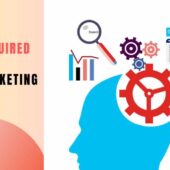Data analytics is the process of collecting, processing, and analyzing data to gain insights into trends, patterns, and relationships that can inform decision-making. In the context of digital marketing, data analytics allows you to understand how your target audience interacts with your brand and content across different channels, such as social media, websites, and email.
With the vast amount of data available, it can be challenging to determine the best strategies to optimize marketing campaigns. That’s where data analytics comes in. By leveraging data analytics, businesses in India can gain valuable insights into their audience and make data-driven decisions to improve their digital marketing strategy.
Table of Contents
ToggleHow to Implement Data Analytics in Your Digital Marketing Strategy:
- Define your goals: Before you start analyzing data, it’s important to define your goals. What do you want to achieve with your digital marketing strategy? Is it to increase brand awareness or generate leads? Once you have defined your goals, you can use data analytics to track your progress and make necessary adjustments.
- Use Analytics Tools: There are a plenty of analytics tools available in the market, both free and paid, that can help you track and analyze data related to your website, social media channels, and other digital marketing efforts. Google Analytics, for example, is a widely used free tool that provides valuable insights into website traffic, user behavior, and more. Using such tools can help you make informed decisions and optimize your digital marketing strategy.
- Analyze audience data: To create an effective digital marketing strategy, it’s important to understand your target audience. Analyzing audience data such as demographics, interests, and behavior can help you create targeted campaigns that resonate with your audience. Google Analytics and social media platforms such as Facebook and LinkedIn provide audience insights that can be used to create more effective campaigns.
- Monitor Website Traffic: Website traffic is a key metric to track when it comes to digital marketing. Analyzing website traffic data can help you identify areas of improvement, such as high bounce rates or low conversion rates. Google Analytics provides data on website traffic, user behavior, and more, which can be used to optimize your website for better user experience and higher conversion rates.
- Social Media Engagement: Social media is a powerful tool for digital marketing, but it’s important to measure its effectiveness. Analyzing social media engagement data such as likes, shares, and comments can help you understand what content attracts your audience and create more effective social media campaigns.
- Track Email Campaigns: Email marketing is still one of the most effective digital marketing channels, and analyzing email campaign data can help you optimize your campaigns for better results. Email marketing platforms such as Mailchimp and Constant Contact provide valuable data on open rates, click-through rates, and more, which can be used to improve your email marketing strategy.
- Analyze Competitor Data: Analyzing competitor data can provide valuable insights into what’s working in your industry and what’s not. Tools such as SEMrush and Ahrefs can help you analyze your competitors’ digital marketing efforts, such as their SEO strategy, social media presence, and more, and use that data to improve your own strategy.
- Optimize your SEO Strategy: SEO is a critical part of any digital marketing strategy, as it helps your website rank higher in search engine results pages. Analyzing data related to your website’s SEO performance, such as keyword rankings and backlinks, can help you identify areas of improvement and optimize your SEO strategy for better results.
- Use A/B Testing: A/B testing is a powerful way to optimize your digital marketing campaigns. By testing different variations of your campaigns, such as different headlines, ad copy, or images, you can determine which variations perform better with your target audience. You can then use this data to optimize your campaigns and improve your digital marketing strategy.
- Focus on user behavior: Data analytics can help you understand your audience better. You can track how users interact with your website, what pages they spend the most time on, what actions they take, and what content they engage with the most. This information can help you optimize your website for better user experience, identify gaps in your content strategy, and make data-driven decisions to improve your digital marketing campaigns.
Conclusion
It is important to continuously monitor and analyze your digital marketing campaigns to identify areas for improvement. By regularly reviewing your data analytics, you can stay on top of trends and adjust your strategy accordingly to improve your results.
If you notice a decline in website traffic, you can investigate the cause and take corrective action to improve your website’s performance. Similarly, if you notice a drop in social media engagement, you can adjust your content strategy to provide more relevant and engaging content to your audience.
Data analytics is a powerful tool for improving your digital marketing strategy in India. By leveraging the data at your disposal, you can gain valuable insights into your audience, optimize your website for better user experience, test different marketing campaigns, and continuously improve your results.



